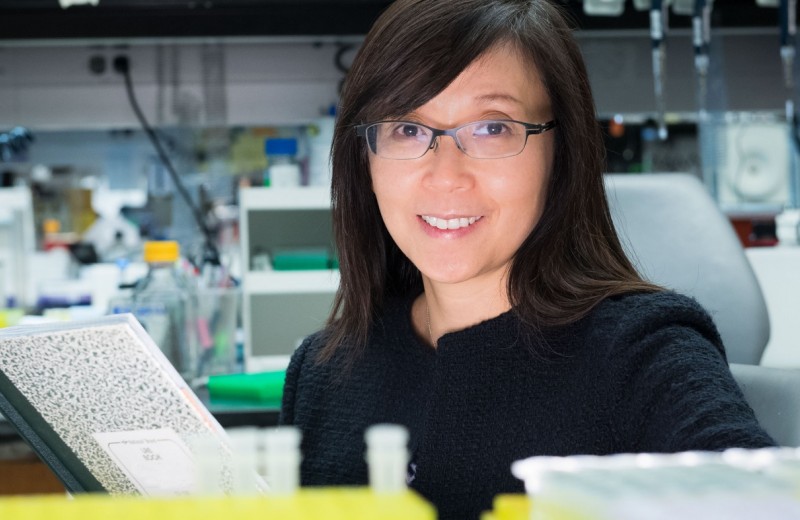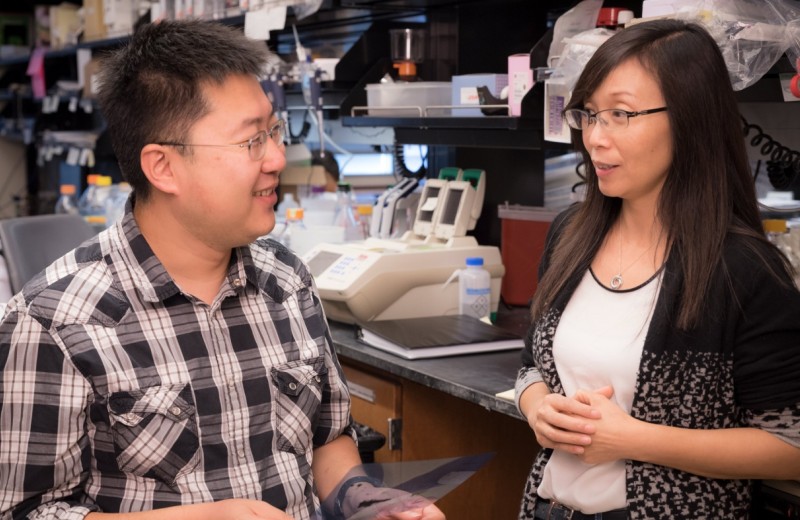Gladstone NOW: The Campaign Join Us on the Journey✕

Li Gan, PhD, a senior investigator at Gladstone, was awarded a multi-million dollar grant by the National Institute of Neurological Disorders and Stroke (NINDS) to lead a national collaboration studying how the protein tau contributes to frontotemporal dementia. [Photo: Chris Goodfellow, Gladstone Institutes]
A new person is diagnosed with dementia every three seconds. The disease afflicts an estimated 47 million people worldwide, and at this rate, the number of people living with dementia will reach 75 million by 2030.
Although it is often over-shadowed by Alzheimer’s disease, which typically afflicts older individuals, frontotemporal dementia is the most common form of dementia in people under age 65. Regardless of the age of onset, both conditions are currently incurable.
Li Gan, PhD, a senior investigator at the Gladstone Institutes, is working to change that. Thanks to an $11 million grant awarded by the National Institute of Neurological Disorders and Stroke (NINDS), Gan will lead a collaboration among national scientists to study how the protein tau affects neurons in the brain and how it causes disease, particularly frontotemporal dementia. Tau has also been implicated in Alzheimer’s disease and a range of other neurodegenerative disorders.
“We believe that there is a connection between mishandling of tau by neurons and neuronal dysfunction,” said Gan, who will serve as the principal investigator for the project. “With our team of experts, we hope to learn how this relationship might be involved in frontotemporal dementia.”
Tau can be modified by chemicals, which affect how the protein is folded, degraded, and trafficked within and outside of neurons. Changes in these activities caused by mutations or other processes can cause protein misfolding or prevent protein degradation, affect the function and distribution of tau, and lead to degenerative diseases.
With the support from the NINDS, Gan and her colleagues will form a center based on three projects that will dissect the relationship between tau and neuronal dysfunction. The projects will focus on three primary questions: what causes tau to accumulate and spread in frontotemporal dementia, how does an imbalance in the handling of tau lead to neuronal dysfunction, and, conversely, how does neuronal dysfunction contribute to abnormalities in tau?
Armed with cutting-edge technology, the team will study tau in neurons created from induced pluripotent stem cells derived from patients with frontotemporal dementia. They will use CRISPR genome-editing technology to correct or insert disease-causing mutations in experimental models, and screen for potential drug targets with the goal of correcting neuronal dysfunction caused by the mutations. The research will be supported by five core facilities within the University of California (UC) system, including the Thermo Fisher Scientific Proteomics Facility for Disease Target Discovery at Gladstone.
“Our facility will help to determine whether changes to the tau protein affect its release or degradation,” said Nevan Krogan, PhD, a senior investigator at Gladstone who oversees the facility. “We will also dissect the mechanisms that influence how brain activity affects the release of tau.”
The center brings together leading experts in the diverse fields of neurobiology, stem cell biology, protein homeostasis, proteomics, functional genomics, and clinical neuropathology. While Gan will lead the first project, Ken Kosik, MD, from UC Santa Barbara and Ana Maria Cuervo, MD, PhD, at Albert Einstein Colllege of Medicine will lead the other two projects. Along with Krogan, Martin Kampmann, PhD, Lea Grinberg, MD, PhD, and Bruce Miller, MD, all from UC San Francisco, and Giovanni Coppola, MD, at UC Los Angeles will run the core facilities instrumental to this effort.
“Through this extensive collaborative network, we hope to discover new mechanisms that cause tau toxicity, create new resources and reagents, and develop innovative technologies,” shared Gan. “This work could lead to major progress in our fight against frontotemporal dementia and other diseases involving tau that affect millions of people across the globe.”
Support Discovery Science
Your gift to Gladstone will allow our researchers to pursue high-quality science, focus on disease, and train the next generation of scientific thought leaders.
New Study Resolves Debate about How the Brain’s Immune Cells Regenerate
New Study Resolves Debate about How the Brain’s Immune Cells Regenerate
Gladstone scientists investigate how microglial cells maintain their population
News Release Research (Publication) Alzheimer’s Disease Neurological Disease Gan LabOne Copy of a Gene May Be Worse Than None at All
One Copy of a Gene May Be Worse Than None at All
A team of researchers shows that missing one copy of the TREM2 gene can exacerbate Alzheimer’s disease pathology
News Release Research (Publication) Alzheimer’s Disease Neurological Disease Gan Lab AgingGrowing Human Brain Cells in the Lab
Growing Human Brain Cells in the Lab
Scientists develop a cheaper, quicker, and more reliable stem cell–based technology to facilitate drug discovery
Gan Lab Stem Cells/iPSCs Alzheimer’s Disease



